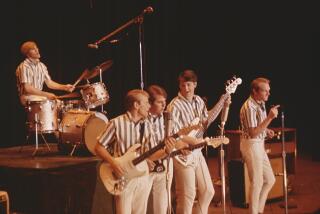POP MUSIC REVIEW : An Outpouring of Celtic Soul by the Waterboys
The Waterboys’ Mike Scott demonstrated Monday night at the Wiltern Theatre that he is a wary, but immensely worthy rock hero.
In his first local appearance in four years, the Scottish-born singer-songwriter came armed with enough inspiring songs and uplifting musicianship to put on a snappy and appealing show that at, say, 90 minutes would have been a guaranteed knockout.
Instead, he and the other six musicians in his band stretched things out to two hours, breaking the natural momentum early in the show in ways that seemed at times stubbornly self-defeating.
Yet, Scott showed in the end that he not only knew what he was doing, but that he has the conviction, purpose and talent to put him near the forefront of contemporary rockers. The most significant aspect of the concert was that Scott now seems comfortable in that role. It wasn’t always the case.
Rarely has someone looked stardom in the face so fully as Scott did four years ago when he stood on the brink of a U2-like adoration in Britain--only to step back to see if he liked where he was headed.
It was a surprising move because Scott burst on the scene in England in 1983 so eager to be accepted as the latest in the rock-as-inspiration tradition of Bob Dylan and Van Morrison that he seemed to demand to march at the head the nearest rock parade. The problem was that his vision wasn’t focused and his craft wasn’t realized.
Scott wrote so many heavy-handed and overblown “message” songs for the band’s first two albums that Trouser Press, a magazine that specialized in the alternative rock scene, quite reasonably called much of his music “hideously pompous” and overproduced.
By the time of his third album, 1985’s “This Is the Sea,” Scott and the Waterboys had begun moving toward warmer and more convincing expressions of spiritually accented idealism and hope.
Despite the advances in his songwriting, there was a somewhat anonymous quality to the band’s music. The songs were still a bit overblown, somewhat adrift in the fashionable currents of rock at the time, rather than asserting an individual voice.
Almost intuitively, Scott backed away from the stardom mantle that was about to be handed him for some soul-searching. He had seen too many other bands reach mass acceptance only to flounder because they didn’t have a solid or purposeful foundation. The break eventually led him to move from London to Ireland, where he put together a new band that enabled him to work with the bright, flavorful Irish folk trimmings that seemed to instill him with a sense of tradition and earthy truth.
His much admired next album, 1988’s “Fisherman’s Blues,” reflected those changes. The songs had the ambition of his early albums, but with a far more personal, perhaps even humble tone that better served his reflections on the search for social and spiritual fulfillment. Here, at last, was music from a man’s heart--all dressed in disarming Celtic ribbons and bows.
Monday’s show at the Wiltern--where Scott will appear again tonight before a concert Thursday at UC San Diego--was an extension of the breakthrough in “Fisherman’s Blues.”
For someone with a somewhat reclusive reputation (no interviews please!), Scott appeared remarkably comfortable and warm--if low-key--on stage, moving about as if he were simply providing entertainment at a neighborhood block party as he stood at the microphone in his black leather fisherman’s cap, an old sport jacket and jeans.
The two opening songs--”Fisherman’s Blues” and “Strange Boat”--outlined the gentle message of optimism and faith at the core of Scott’s compositions.
“We’re livin’ in a strange time / Workin’ for a strange goal / We’re turnin’ flesh and body / into soul,” he sang in the latter number, virtually defining his musical destination. The journey itself was sometimes slow--frustratingly so as the Celtic coloring (provided by such instruments as the accordion, mandolin and fiddle) neutralized the emotion of the songs (especially a version of Bob Dylan’s “Girl from the North Country”) and the frequent use of traditional numbers broke the momentum of Waterboys’ own punchy songs.
At about the half-way mark, however, Scott seemed satisfied that he had introduced the roots of his music. He picked up an electric guitar and went into a series of explosive rockers that had the audience--which had seemed a bit drowsy at times--on its feet, fully engrossed.
By this time, the mixture of folk warmth and rock bite was so unified in his music that it seemed only natural when Scott brought out the nearly two dozen members of the Scottish Fiddlers of Los Angeles group for a jam that offered the warm, communal feel that is such a winning feature of Los Lobos concerts.
Like Bruce Springsteen, Scott realizes that you can’t just go out to serve the audience if you are going to have a lasting and meaningful--as opposed to superficial--relationship with that audience. Scott knows that what he has to serve are his own artistic impulses.
It’s that realization that fuels his new music and performance with a triumphant and liberating edge. He needs a few more songs of the level of the “Fisherman’s Blues” material before he can be reasonably ranked with the models he so much admires, but he flashed signs of greatness on Monday.
Opening the bill was Show of Hands, a local folk trio that in its overly earnest moments seems too much like a hard-edged, contemporary version of Peter Paul & Mary, but at times(especially in the song “Langston Hughes”) seems to have in a challenging spirit worth exploring.
San Diego Performance. The Waterboys will perform Thursday at UCSD’s Price Center Ballroom.
More to Read
The biggest entertainment stories
Get our big stories about Hollywood, film, television, music, arts, culture and more right in your inbox as soon as they publish.
You may occasionally receive promotional content from the Los Angeles Times.








